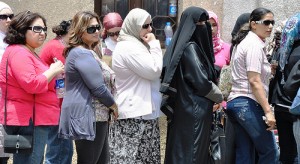Egypt’s 2012 Presidential Elections: First Round Results
Posted on: April 28, 2012, by : Editor The first round of Egypt’s landmark presidential elections were held last week and today it was confirmed that there will be a run-off between the top two candidates, Mohammed Morsi of the Muslim Brotherhood’s Freedom and Justice Party and Ahmed Shafiq, ousted leader Hosni Mubarak’s last Prime Minister. Morsi received just about 26% of votes from the first two-day round and Mr. Shafiq fielded about 23%.
The first round of Egypt’s landmark presidential elections were held last week and today it was confirmed that there will be a run-off between the top two candidates, Mohammed Morsi of the Muslim Brotherhood’s Freedom and Justice Party and Ahmed Shafiq, ousted leader Hosni Mubarak’s last Prime Minister. Morsi received just about 26% of votes from the first two-day round and Mr. Shafiq fielded about 23%.
Given that neither of the top two candidates came close to the minimum 50% they need to be elected in the first round, both are scrambling to gain the support of losing candidates and their constituencies ahead of the run-offs scheduled for June 16-17. The contest is predicted to be close and tense in the coming weeks, as the choice between Morsi and Shafiq promises to be divisive and points to a choice between the old regime and a fully Islamist Egypt.
By the numbers:
The Secretary General of the High Presidential Elections Commission Hatim Bagato declared that 50,406,366 in 356 general committees and 13,596 substations were eligible to participate in the elections. 14,703 judges were set to monitor the elections and direct the polling stations. The first day of voting, governorates reported high turnouts, however, on the second day, some reported very low turnouts. Overall, the Commission estimated the turnout was 46% of eligible voters.
Mohammed Morsi received 5,764,952 votes putting him slightly ahead of Ahmed Shafiq, who earned 5,505,327 votes. About half of first-round votes went to candidates somewhere in the middle ground—from leftist Hamdeen Sabahy, third-placed with 20.4 percent, to moderate Islamist Abdel Moneim Abol Fotouh, with 17.2 percent, and former Arab League secretary-general Amr Moussa, with 10.9 percent. The difference between the second and third place candidates was approximately 700,000 votes.
Reported violations:
The third, fourth, and fifth place candidates filed appeals with the election commission before Sunday’s deadline, alleging fraudulent acts, however, these were rejected by the six judges forming the electoral committee. Monitors reported violations, as well, including bribery in seven governorates reported by the Egyptian Union for Observation and 300 complaints against violations reported to the National Council for Human Rights.
Run-off candidates:
Mohammed Morsi is a member of the Muslim Brotherhood’s Freedom and Justice Party. Under Mubarak, he served as a member of parliament from 2000-2005, as an independent, since the Muslim Brotherhood was technically banned from fielding candidates under Mubarak.
In 2012, the Freedom and Justice Party proposed its first presidential candidate, Khairat El-Shater, who resigned from the Muslim Brotherhood in order to prevent it from breaking its pledge to not field a candidate. However, his nomination violated electoral policy stipulating that candidates must have been released from prison for at least six years before candidacy in order to qualify. Morsi replaced him at this time and is seen by supporters as the hope for a country run by religion within a democratic framework.
Ahmed Shafiq is a former Air Force commander and longtime friend of ousted leader Hosni Mubarak. He was also the last Prime Minister appointed under Mubarak and his supporters see him as the man who can impose security and crackdown on protests viewed as damaging to the economy.
The country will be taxed in mid-June with deciding between polar opposites. There are fears and concerns with each and supporters of the revolution worry that these results will result in further isolation and oppression. The military council has promised to lift the state of emergency on May 31 and hand over control to the elected president on July 1.
Image courtesy of UN Women Arab States under a Creative Commons license.
